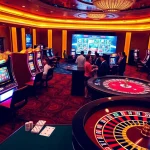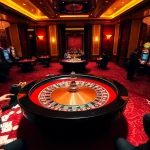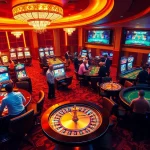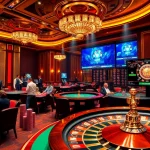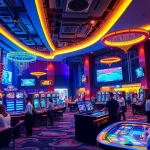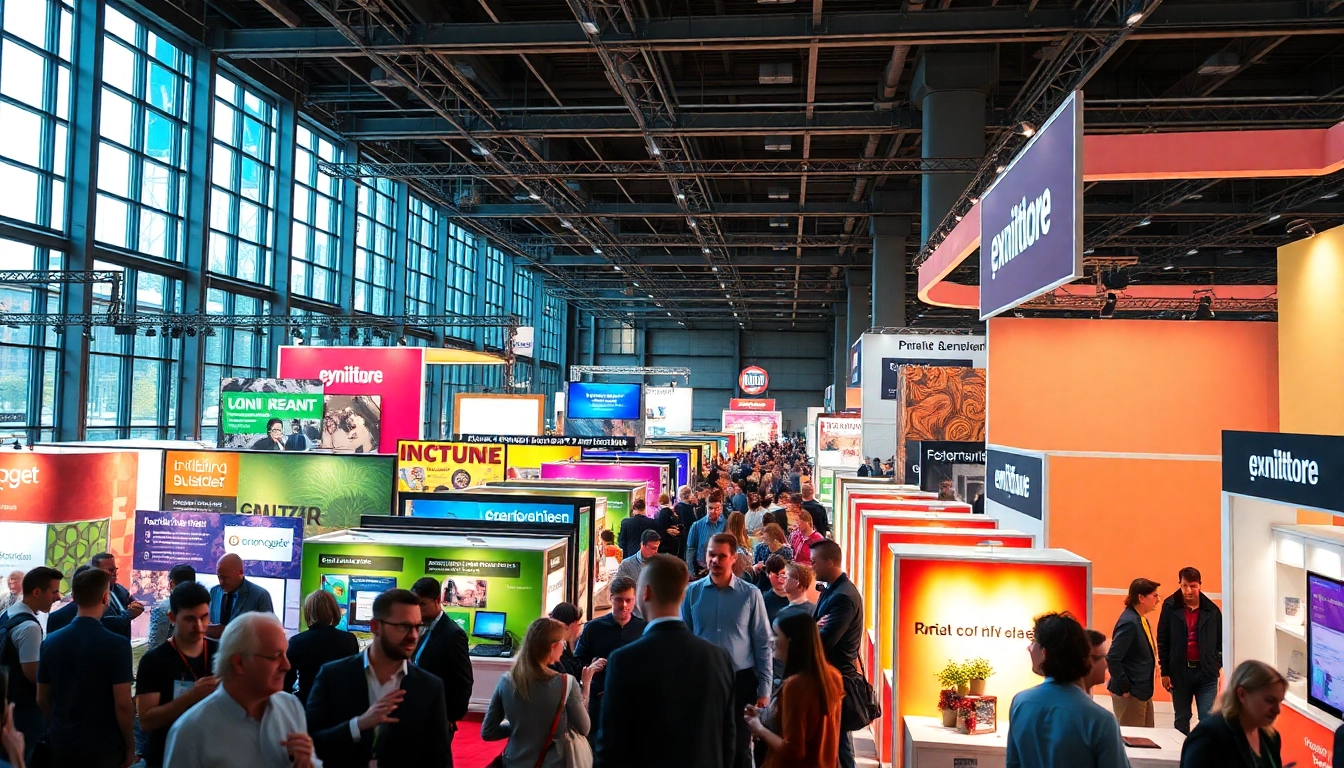Understanding Exhibition Companies UK
What are Exhibition Companies?
Exhibition companies in the UK are specialized firms that focus on organizing, designing, and building stands for trade shows, exhibitions, and other promotional events. These companies play a crucial role in facilitating businesses to showcase their products and services to a larger audience. The services offered by exhibition companies include stand design, construction, installation, and logistics management, ensuring that everything from aesthetics to functionality is meticulously addressed.
The Role of Exhibition Companies in Brand Promotion
In today’s competitive market, having a standout presence at exhibitions is essential for brand visibility and growth. Exhibition companies work closely with businesses to create custom displays that not only attract attention but also convey brand messaging effectively. They understand the importance of design aesthetics, audience engagement, and multimedia integration to create immersive experiences that resonate with visitors. By leveraging their knowledge and expertise, brands can captivate their audience, thus maximizing their promotional impact.
Why Choose Local Exhibition Companies in the UK?
Opting for local exhibition companies in the UK has significant advantages. Firstly, they possess in-depth knowledge of the regional market and cultural nuances, which helps in creating more relevant and appealing exhibits. Secondly, working with local firms often leads to smoother communication and collaboration, allowing for a more agile response to changes during the planning and execution stages. Finally, local companies may have established relationships with venues and vendors, which can streamline the logistics involved in setting up an exhibition.
Top Exhibition Companies in the UK
Leading Players in the Exhibition Sector
Several exhibition companies have established themselves as leaders in the UK market. Companies like Team Tecna are renowned for their bespoke exhibition stand design and construction services that cater to a diverse clientele. Similarly, GES, a global leader in event solutions, partners with brands and venues to deliver award-winning exhibitions [source](https://www.ges.com). Other noteworthy mentions include the Montgomery Group, which has been a cornerstone of the UK exhibition landscape through its extensive portfolio of events.
What Sets These Companies Apart?
What differentiates these leading exhibition companies is their commitment to innovation and quality. For instance, many of them utilize advanced technology, like augmented reality and interactive displays, to enhance visitor engagement. Their design philosophies often focus on sustainability, utilizing eco-friendly materials and practices to create exhibition stands that minimize environmental impact. Furthermore, these companies excel in providing comprehensive services, ensuring a seamless experience from conceptualization through to event execution.
Customer Success Stories and Case Studies
Various case studies illustrate the transformative impact of effective exhibition strategies. For instance, a technology firm that collaborated with an exhibition company to develop an interactive booth saw a 50% increase in lead generation compared to previous events. This success was attributed to the booth’s engaging design, coupled with knowledgeable staff who could effectively communicate the product’s value proposition. Such stories highlight the potential ROI from investing in professional exhibition services.
Best Practices for Collaborating with Exhibition Companies UK
How to Choose the Right Exhibition Partner
Selecting the right exhibition partner is vital for a successful exhibition experience. Begin by evaluating the company’s portfolio to assess the quality and variety of their previous projects. Reviews and testimonials can provide insights into customer satisfaction and effectiveness. Moreover, it’s crucial to assess their industry expertise, especially if you operate in a niche market. A partner who understands your business’s specific needs is better positioned to deliver impactful results.
Key Questions to Ask Before Hiring
Before settling on an exhibition company, consider the following questions: 1) What is your experience with exhibitions in our industry? 2) Can you provide references from previous clients? 3) What is your project management process? 4) How do you handle unforeseen challenges? 5) What design concepts do you suggest for our exhibition needs? By asking these questions, you can gauge the company’s ability to meet your expectations and adopt a collaborative approach.
Aligning Objectives with Your Exhibition Goals
To maximize the success of your exhibition, it’s essential to align your objectives with the exhibition goals. Begin by defining clear, measurable goals such as lead generation, brand awareness, or networking opportunities. Share these objectives with your chosen exhibition company, as this will guide the design and overall strategy. Regular touchpoints during the planning stage are also important to ensure that the exhibition aligns with your marketing strategy and brand values.
Challenges When Working with Exhibition Companies
Common Pitfalls to Avoid
While working with exhibition companies can yield great results, several pitfalls should be avoided. One common issue is insufficient communication, which can lead to misaligned expectations and disappointing outcomes. To mitigate this, establish clear lines of communication and schedules for regular updates. Additionally, avoid assuming that once you hire a company, the work is done. Continuous involvement and regular feedback are essential for refining the exhibition strategy.
Maximizing ROI on Your Exhibition Investment
To maximize the return on investment from exhibitions, it’s crucial to track your performance metrics. Set specific KPIs such as visitor engagement rates, the number of leads generated, and post-event sales. After the exhibition concludes, conduct a thorough analysis of these metrics and compare them against your established goals. This analysis will help in understanding what worked and what areas require improvement for future exhibitions.
How to Streamline Communication and Project Management
A seamless communication strategy is vital for effective project management with exhibition companies. Utilize project management tools that allow for clear task delegation, timeline tracking, and status updates. Encourage open communication between your team and the exhibition firm to address any issues promptly. Regular check-ins can also help to prevent potential setbacks and ensure that everyone remains aligned throughout the process.
Future Trends in the UK Exhibition Industry
Emerging Technologies and Their Impact
As technology continues to evolve, its impact on the exhibition industry grows exponentially. Virtual reality (VR) and augmented reality (AR) are redefining how brands engage with audiences, allowing for immersive experiences that attract visitors. Additionally, the integration of artificial intelligence and data analytics can provide deeper insights into visitor behavior, enabling more personalized marketing strategies. Keeping abreast of these trends is essential for businesses looking to stay competitive in the exhibition space.
Sustainability Practices in Exhibition Designs
With increasing emphasis on environmental responsibility, sustainable exhibition practices are becoming more prevalent. Many exhibition companies are now focusing on using reusable or recyclable materials, reducing waste, and implementing energy-efficient solutions in their designs. Businesses are encouraged to collaborate with companies that prioritize sustainability, as this not only aligns with corporate social responsibility but also resonates with environmentally conscious consumers.
Preparing for Post-Pandemic Exhibition Strategies
The COVID-19 pandemic forced a paradigm shift in how exhibitions are organized and executed. Hybrid events, which combine in-person and virtual elements, are now a common model, allowing for greater flexibility and wider audience reach. Companies should prepare for this new normal by adopting technologies that facilitate engaging virtual experiences while still delivering value to in-person attendees. Embracing change and being adaptable will be key attributes as the exhibition landscape continues to evolve.
